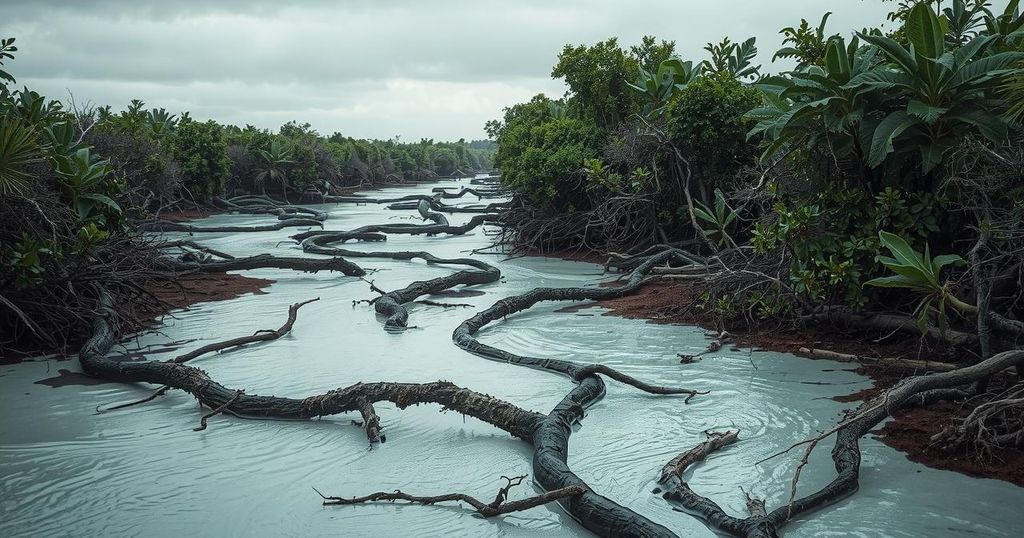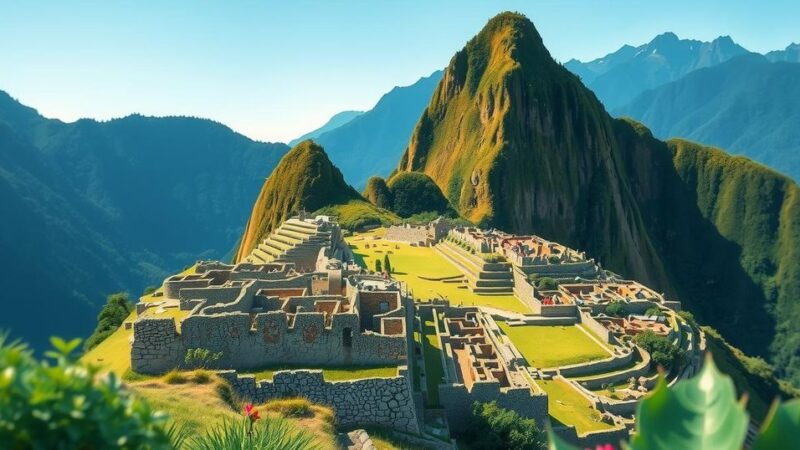Ecuador’s Esmeraldas province endured a disastrous oil spill on March 13, releasing over 25,000 barrels into crucial waterways and impacting thousands. Despite government attempts to downplay the situation, the spill has revealed critical infrastructure vulnerabilities and raised alarms about future oil extraction plans. Activism, including Amazon Watch’s campaign, seeks to prevent further environmental harm.
On March 13, Ecuador experienced a catastrophic oil spill that released over 25,000 barrels of crude oil into the rivers and protected areas in the Esmeraldas province. This environmental disaster contaminated drinking water and seriously impacted the public health and economies of around half a million residents. The spill also harmed local ecosystems, coating the mangroves and wildlife in areas where the Esmeraldas River meets the Pacific Ocean.
Local officials described the oil spill as a “geyser” that spewed oil for up to seven hours, leading the Esmeraldas mayor to declare it a national emergency. In response, President Daniel Noboa attempted to downplay the crisis. Initially, the environment minister reported falsely low figures of 3,600 barrels spilled and delayed releasing accurate information until well after the incident.
The crisis worsened when a reservoir holding contaminated water breached on March 25, escalating pollution and hindering cleanup efforts. By April 7, residents protested the government’s slow response, facing shortages of potable water, food, and financial assistance while their economies based on fishing and tourism remained severely disrupted.
Despite being in Esmeraldas for a campaign event, President Noboa did not visit affected communities, nor did government officials present themselves before Congress to discuss mitigation actions. The Esmeraldas spill marks the worst oil disaster in Ecuador in over three decades, highlighting the ongoing risks associated with oil infrastructure in the nation.
The history of oil exploration in Ecuador dates back to 1972 with the construction of the Trans-Ecuadorian pipeline (SOTE) that spans 497 kilometers. Designed with cost efficiency in mind, the pipeline’s above-ground installation lacks adequate shutoff valves, placing it in a precarious position across numerous fault lines and other geological hazards.
Petroecuador has managed this deteriorating pipeline infrastructure since 1989, encompassing a network that encroaches on Indigenous territories and local communities. Chronic negligence and inadequate disaster preparedness have led to thousands of oil spills reported over the years. In the past decade alone, government records confirm over 1,100 reported spills, with a worrying escalation in frequency—averaging two spills per week by 2020 and up to 11 weekly in 2022.
The Esmeraldas disaster raises significant concerns for communities along Ecuador’s aging pipeline corridors, already functioning below capacity. Nonetheless, both the Noboa administration and his opponent Luisa Gonzales plan to initiate a new oil auction in the Amazon—a proposal that could expand drilling into 4.5 million acres of rainforest, exacerbating the existing infrastructural failures.
In solidarity with the affected communities, Amazon Watch supports initiatives opposing new oil extraction projects. Their End Amazon Crude campaign aims to halt further drilling and oil spills by holding the Ecuadorian government accountable and stopping extraction at its source. Soon, the organization will facilitate meetings in California with Indigenous leaders to address their growing concerns over Ecuador’s oil exploration.
If successful, these efforts might secure approximately 800 million barrels of oil intact, providing critical protection for Indigenous rights, biodiversity, and overall climate stability.
The recent oil spill in Ecuador’s Esmeraldas province has highlighted severe deficiencies in environmental management and disaster preparedness, resulting in devastating effects on local communities and ecosystems. As the country grapples with its oil-related crises, concerns mount over future drilling plans that could further compromise both natural resources and community welfare. Initiatives like Amazon Watch’s End Amazon Crude campaign seek to prevent ongoing exploitation of the Amazon, aiming to halt detrimental practices and protect vital territories from further ecological damage.
Original Source: amazonwatch.org






